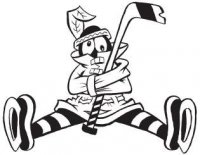While this NHL summer has contained the usual excitement for fans as their teams add draft picks and free agents, make trades and talk up all their prospects, no fan can escape the horror that the deaths of three players (one just recentrly retired).
I can't remember any major sport having an offseason like this.
News broke Wednesday night that Wade Belak, an enforcer for the Predators, Leafs, Avalanche, Flames, and Panthers hanged himself. He was 35.
Belak was in the same role that Derek Boogard and Rick Rypien were, the other two to pass away this summer from either drug overdose or their own hand. The fear -- and it didn't stop me when Rypien died -- is that there will be a massive overreaction to the role of fighting in the game.
While it should be studied, that's probably not looking at the same problem.
The first thing, and many players have come out in the past 24 hours to say this, is hockey needs to look at how they handle mental illness amongst its players. Make no mistake, hockey has a macho code to it that probably keeps a lot of players from disclosing mental problems or seeking out a therapist or doctor for fear of being seen as weak by opponents and, worse, their teammates.
Combine that with an under-educated group of players (most of the NHL does not finish college, if they attend at all) coming out of backwater Canadian towns, where they most likely aren't taught about mental illness, and you have a serious problem.
Both the NHL and players union have to construct a system where players feel comfortable coming forward and admitting what struggles they are having before it is too late. It is not just enforcers who are feeling anxiety, depression, and stress and are choosing the wrong paths to medicate it.
Thankfully, this is exactly what both bodies have said they will do today.
They also must look into how players are medicating themselves, as it's unlikely these were the only three players who had substance abuse problems. Considering the physical toll hockey takes on its players, the problem could be large.
But what about the fact they were all enforcers? I don't know, it's such a touchy area. Those who achieve their dreams by the most savage way possible have a unique mindset. Did concussions play a part? If they did, repeatedly geting punched in the face probably didn't help.
This should be studied if possible.
But that role, well, it should be studied too. I'm not advocating a ban on fighting. But the guy on the end of the bench who does nothing but, we have to finally decide if the game really needs that.
I don't think there's a question that that guy, who lies awake at night knowing he'll only get to keep wearing an NHL uniform by fighting the other guy lying awake at night on the other team faces a unique set of pressure and tension.
How he deals with that also might be unique. I said it before I don't want to quash people's dream of being in the NHL. But what do they bring to the game? What do these "staged" fights really add to our enjoyment? And what are they taking out of those players?
I still think the answer comes back too much.

Sam Fels is the proprietor of The Committed Indian, an unofficial program for the Blackhawks. You may have seen him hocking the magazine outside the United Center at Gate 3. The program is also available for purchase online. Fels is a lifelong 'Hawks fan and he also writes for Second City Hockey .

